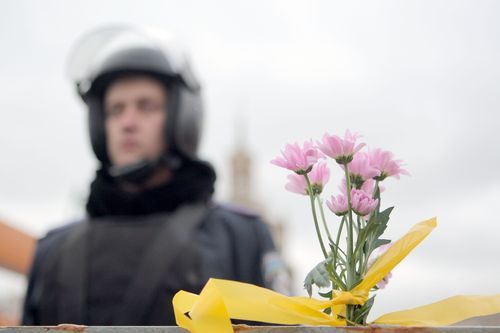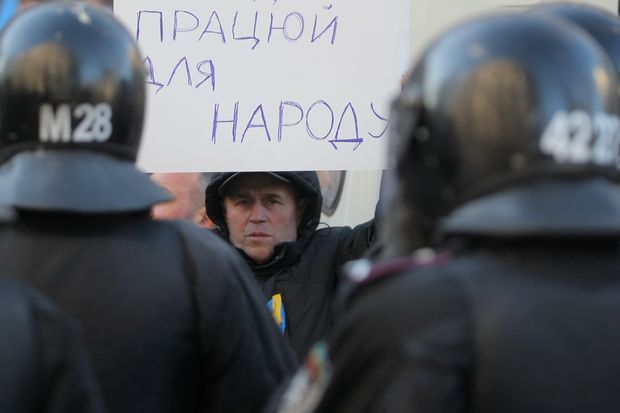Can a bridge be made out of barricades?
Expert opinion: in order to establish a dialog between the police and the people, an action of civil reconciliation is necessary. But is it possible in the current conditions?
“At the moment, the government and law-enforcement systems are directed at the protection of interests of one political force and one person,” says Vitalii Yarema, former head of the Kyiv office of the Ministry of Internal Affairs of Ukraine, at a press conference with a symbolic name “The Police on the People’s Side.” “In this sense, we have to look at the actions of law-enforcement officers. If we view them from the perspective of the functions they performed on November 30 and during the night of December 11, we can see unambiguous abuse of power. For example, a special device, rubber baton, which was used against the protesters, can be used only on soft part of the body. Instead, we saw that people were hit on the head. It is the violation of instructions, and officers must bear responsibility for it.” But the question is whether they will actually bear responsibility. Especially given the news that was spread on the Internet about Berkut fighters being supposedly awarded for the dispersal of peaceful protest rallies.
In general, experts emphasize that law-enforcement officers are obliged to execute orders given by the leadership. Still, according to law, they also have the right to refuse to perform criminal orders, but the officers did not use this right. According to Yarema, the behavior of the police was caused by several factors.
“It is no secret that every Berkut fighter that participated in the operation on November 30 received a monetary incentive of 500 US dollars for beating the students. A regular policeman’s salary is miserably low, so it motivates them to earn money in this way. But if a person agrees to do such thing, it shows their low morale,” Yarema says.
Besides, our police are separated from the people by sheer fear, the expert adds. “In Ukraine the law-enforcement institutions and criminal powers have merged. It gave birth to such phenomenon as titushkos [goons, who are suspected to be sponsored by government]. Even police officers are afraid of them now. Everyone knows about the case when titushkos attacked police officers who tried to protect journalists during a rally. I will give another example, which I witnessed in person. During the rally of December 1, we detained a man who tried to throw a Molotov cocktail through the window of the Kyiv City State Administration building. I personally called the head of the Shevchenkivsky District Police Department and asked for the man’s actions to be documented, but I received an answer that he was released. Law-enforcement officers did not even establish his identity. Titushkos stand over the police,” Yarema says.
“35.6 PERCENT OF THE CITIZENS SUPPORT THE DISBANDMENT OF BERKUT”
According to the Razumkov Center research, carried out in March 2013, the level of confidence in the police is about 9.2 percent. At the same time, 54 percent of people do not trust the police at all. Today, according to the forecasts, the situation has become even worse. The citizens are especially critical about Berkut, a unit of riot police. In the current conditions, the name of this unit is an equivalent of a dirty word for an ordinary Ukrainian. Overall 35.6 percent of the citizens support the disbandment of Berkut.
“Berkut has discredited itself completely and must be disbanded,” Yarema says. “Once, really dedicated people worked for it, but 20 years of heroism turned into disgrace in 10 days. This unit does not perform its functions, becoming instead an object of aggression and hatred of ordinary citizens.”
Valeria Rybak, coordinator of the OZON civic observation group, also says that nowadays law-enforcement institutions do not perform their duties, or perform them only in part. This decreases the level of people’s trust as well. “There were no representatives of law-enforcement institutions during the events of December 1 in Maidan, even though they must control such gatherings. Instead, they guarded state institutions. Besides, in the circumstances that took shape later, they should have ensured the unobstructed access of ambulances to the site of the clash, which also did not happen. Let alone the show that took place during the night into December 11. There were a lot of media representatives at the barricade in Instytutska Street, so events unfolded in a peaceful manner, no force was applied. Instead, in other parts of Maidan fighters applied martial arts techniques against people and pulled separate individuals out of the crowd,” the expert says.

SLOGAN READS: “WORK FOR THE PEOPLE” / Photo by Artem SLIPACHUK, The Day
Yarema offers the restructuring of the law-enforcement system as a way out of the current situation. “This is one of our main goals. The actions performed by the police are impossible in a democratic society, they must be stopped. We have several projects of reforms that we are currently working on. There is an idea of transferring law-enforcement bodies to a contract service, and head of the police, who will also be hired according to a contract, will receive a special status that will free him from political pressure from any government,” he explains.
“THE GOVERNMENT’S BEHAVIOR IS UNFAIR IN RELATION TO THE POLICE”
In his conversation with The Day, retired Major General Vadym Hrechaninov condemns not only behavior of law-enforcement officers in Maidan, but also the government’s behavior towards the police. “What happened in Maidan is a lack of foresight and cultural illiteracy. The government’s behavior is unfair in relation to the police. Every police officer has a family and children, and they were simply set up, because people who gave orders knew that neither ordinary employees, nor officers could refuse to execute the order. Today, the main condition of security for us is the government that thinks and carries out its policy in a way to avoid situations like the one that formed today,” Hrechaninov says.
According to Oleksii Melnyk, leading expert for military programs at the Razumkov Center, the police is not a homogeneous body, and this complicates the establishment of a dialog. “It is obvious that there are people in the police force who followed their calling, who try to obey the law and perform their duties. There is another part of policemen, who view the police as a mandate for enrichment and lawlessness. The dialog should be established with the first group, while doing it with the second one is out of the question. It is necessary for people to understand that the police are not occupants, they are the same Ukrainians as us. A dialog between the society and the police must be established. But the current level of mistrust and disappointment with the police and the government in general among the people is very high. It is critical now, and it has become like that long before the events in Maidan. Moreover, the renewal of trust is out of the question as long as Berkut exists, because it has tarnished the image of the police.”
Instead, Olha Bilyk, spokesperson of the Kyiv office of the MIA, states that the tension between the police and citizens is practically nonexistent. “The police are trying to be tolerant, they explain to people that everyone has peaceful intentions. Law-enforcement institutions perform all their functional duties and try to do their best to protect the interests of citizens. The police are working in the same mode as usual: people show up with appeals, crimes are solved. In general, if we do not take the central part of the city into consideration, I would not say that we had any incidents. Even the central part did not have specific problems: people advance slogans, draw signs, but the majority is in a peaceful frame of mind,” Bilyk says. In her opinion, it is not that hard to bring back the trust of citizens in the police. “It is necessary for the police to work in a regular mode, perform their duties, and everything will go back to normal in time. People understand perfectly well that despite all the conflicts, the major part of law-enforcement employees works for the good of citizens,” Bilyk says.
Today, the police and the people are on the opposite sides of the barricades. But Yarema assures: all law-enforcement officers understand that the events that unfold in Maidan affect their future and the future of their families as well. And it depends on Maidan, whether they will continue executing criminal orders of the government, or start working in the interest of citizens, which the oath says they must do.
Newspaper output №:
№83, (2013)Section
Day After Day





